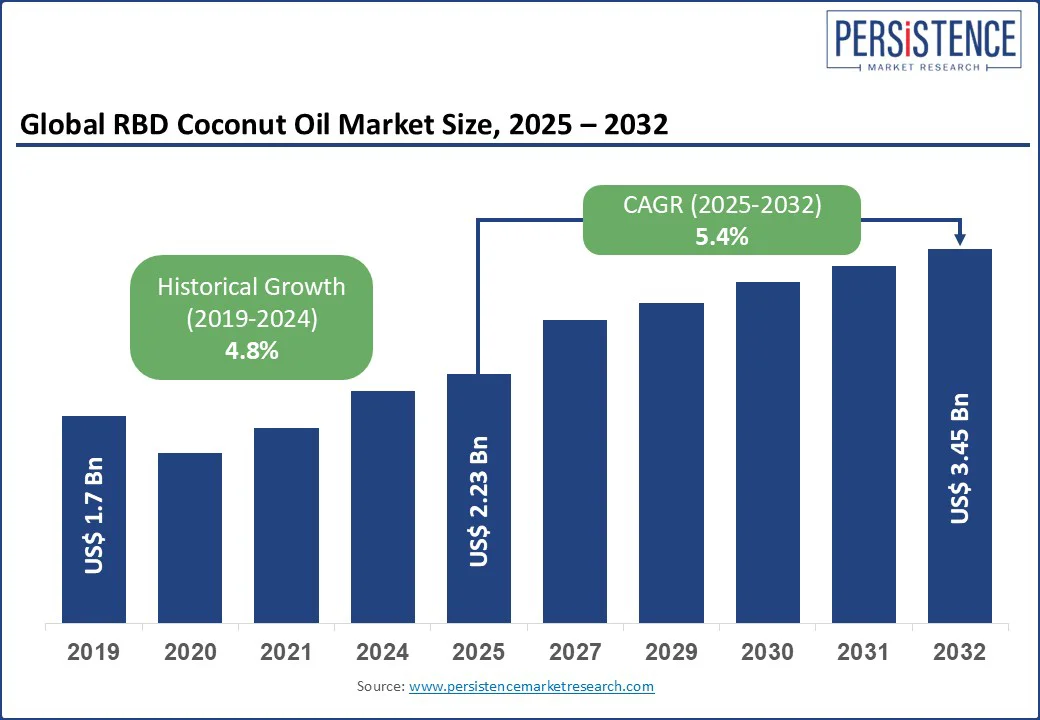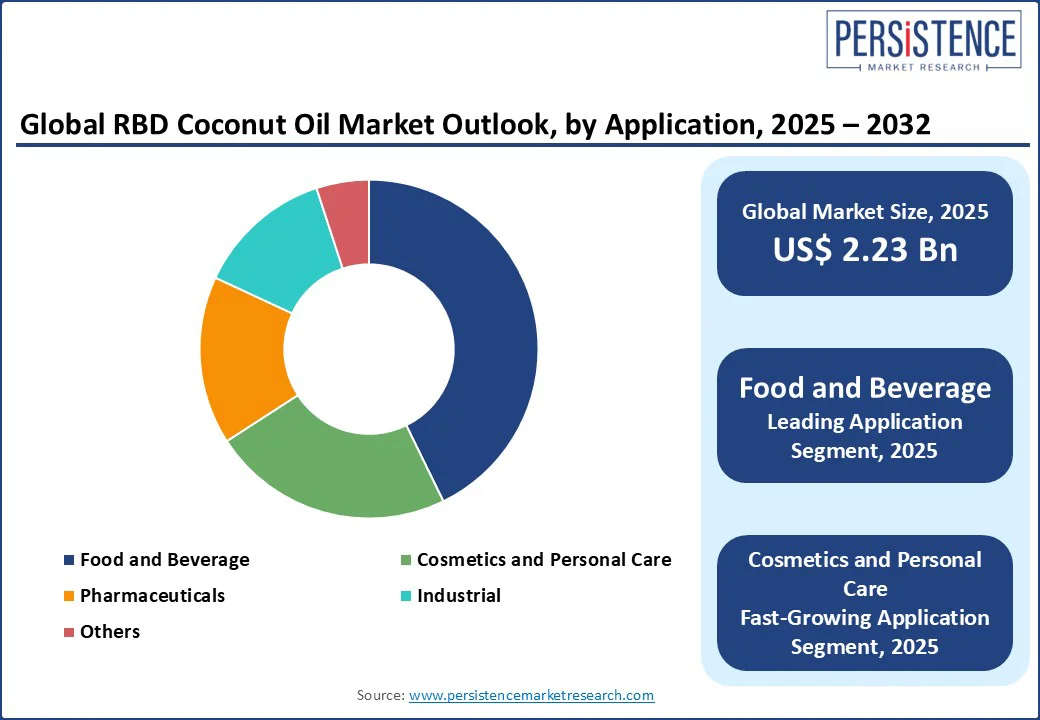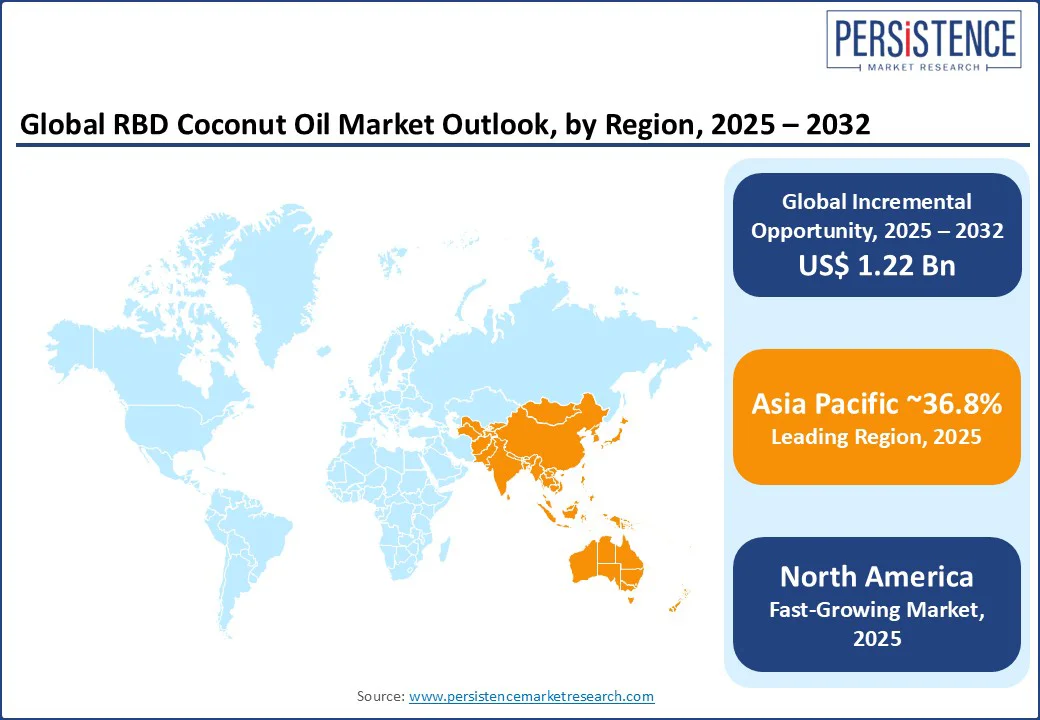ID: PMRREP32430| 188 Pages | 2 Sep 2025 | Format: PDF, Excel, PPT* | Food and Beverages

The global RBD coconut oil market is likely to value at US$2.23 Bn in 2025 and is expected to reach US$3.45 Bn by 2032, growing at CAGR of 5.4% during the forecast period from 2025 to 2032.
The RBD coconut oil market is experiencing robust growth, driven by increasing consumer demand for versatile, plant-based oils in food, cosmetics, and industrial applications. RBD coconut oil, valued for its stability, neutral flavor, and long shelf life, is widely used across industries due to its high lauric acid content and versatility. The rise in health-conscious consumer trends, coupled with the expansion of e-commerce and sustainable sourcing practices, supports market growth. Advances in refining technologies and growing applications in pharmaceuticals further bolster the market’s upward trajectory through 2032.
Key Industry Highlights:

|
Global Market Attribute |
Key Insights |
|
RBD Coconut Oil Market Size (2025E) |
US$ 2.23Bn |
|
Market Value Forecast (2032F) |
US$ 3.45Bn |
|
Projected Growth (CAGR 2025 to 2032) |
5.4% |
|
Historical Market Growth (CAGR 2019 to 2024) |
4.8% |
The global RBD coconut oil market is witnessing significant expansion due to increasing consumer preference for plant-based and health-conscious products. RBD coconut oil, with its high lauric acid content, is recognized for its antimicrobial properties and stability, making it a preferred choice in food and beverage applications, particularly in vegan and keto diets. The International Coconut Community projects a slight increase in global coconut oil consumption from 3.20 million metric tons (MMT) in 2024 to 3.23 MMT in 2025, driven by demand in plant-based food products.
In the Asia Pacific, countries such as Indonesia and the Philippines, which account for 60% of global coconut production per the FAO, drive supply availability. In North America, the U.S. Department of Agriculture reports an increase in plant-based food sales in 2024, boosting demand for RBD coconut oil in processed foods. Companies such as Cargill Incorporated and Wilmar International are expanding production to meet this demand, with sustainable sourcing initiatives further enhancing market growth through 2032.
The RBD coconut oil market faces challenges due to fluctuating coconut supply and competition from alternative vegetable oils. Coconut production is highly dependent on climatic conditions, with droughts and typhoons in key producing regions such as the Philippines and Indonesia causing supply disruptions. In 2023, the FAO reported a 5% decline in coconut yields in Southeast Asia due to adverse weather, impacting RBD coconut oil production costs. Additionally, competition from palm oil, soybean oil, and sunflower oil, which are often cheaper, poses a threat. For instance, palm oil’s lower price point, as noted by the World Bank, makes it a preferred choice in cost-sensitive markets. Limited scalability of organic coconut farming and high refining costs further restrain market growth, particularly for smaller manufacturers, hindering overall market expansion.
The increasing adoption of RBD coconut oil in cosmetics and pharmaceuticals presents significant growth opportunities. Its moisturizing properties and stability make it a key ingredient in skincare, haircare, and pharmaceutical formulations. The global cosmetics market is highly valued as valued higher in 2025 and is driving demand for natural ingredients such as RBD coconut oil, particularly in North America and Europe. The pharmaceutical sector also utilizes RBD coconut oil in drug delivery systems due to its bioavailability. Companies such as Archer Daniels Midland and Phidco are innovating with organic RBD coconut oil for premium cosmetic brands, aligning with consumer demand for clean-label products. Government initiatives, such as the EU’s sustainable sourcing regulations, encourage eco-friendly production, creating opportunities for manufacturers to develop high-quality, sustainable RBD coconut oil to meet evolving industry needs through 2032.

Asia Pacific dominates the RBD coconut oil market, holding a 36.8% share in 2025, driven by high coconut production and robust demand in the food and cosmetic industries. Indonesia and the Philippines, producing 60% of global coconuts per the FAO, ensure a steady supply of raw materials. India’s growing food processing industry, supported by government initiatives such as the Make in India campaign, boosts demand for conventional RBD coconut oil. The region’s cosmetic sector, particularly in Japan and South Korea, drives organic RBD coconut oil adoption. Companies such as PT SIMP and Sumatera Baru are expanding production to meet regional and global demand, with Indonesia’s plantation expansion plans ensuring sustained market growth through 2032.
North America is the fastest-growing region, propelled by rising consumer demand for plant-based and natural products in the U.S. and Canada. The cosmetics sector, driven by clean beauty trends, boosts organic RBD coconut oil demand. Companies such as Cargill Incorporated and Archer Daniels Midland dominate with extensive distribution networks, catering to health-conscious consumers. E-commerce platforms enable consumers to access a wide range of RBD coconut oil products, compare brands, and make informed choices. Manufacturers are leveraging digital marketing strategies and social media to enhance brand visibility and engage directly with consumers. Canada’s growing pharmaceutical sector further supports market expansion, with sustainable sourcing initiatives aligning with consumer preferences, ensuring North America’s rapid growth through 2032.
Europe is the second fastest-growing region, driven by stringent regulations on sustainable sourcing and rising demand in cosmetics and food sectors in Germany, France, and the UK. The European food market supports RBD coconut oil use in plant-based products.
The cosmetics industry, particularly in France, drives demand for organic RBD coconut oil in premium skincare brands. Companies such as Bunge Limited and The Hallstar Company are innovating to meet EU sustainability standards, such as the Green Deal, ensuring high-quality offerings. Europe’s focus on clean-label products and eco-friendly practices drives market growth through 2032.

The global RBD coconut oil market is highly competitive and fragmented, with numerous domestic and international players. Leading companies such as Cargill Incorporated, Wilmar International, and Archer Daniels Midland dominate through extensive product portfolios and global distribution networks. Regional players such as PT SIMP and Sumatera Baru focus on localized offerings in the Asia Pacific. Manufacturers are investing in sustainable sourcing and advanced refining technologies to enhance market share, driven by demand for organic and high-quality RBD coconut oil in food and cosmetic applications.
The RBD coconut oil market is projected to reach US$2.23 billion in 2025.
Rising demand for plant-based and health-conscious products, and expanding applications in cosmetics and pharmaceuticals are the key market drivers.
The RBD coconut oil market is poised to witness a CAGR of 5.4% from 2025 to 2032.
The growing applications in cosmetics and pharmaceuticals are the key market opportunities.
Cargill Incorporated, Wilmar International, Archer Daniels Midland, and Bunge Limited are key market players.
|
Report Attribute |
Details |
|
Historical Data/Actuals |
2019 - 2024 |
|
Forecast Period |
2025 - 2032 |
|
Market Analysis |
Value: US$ Bn/Mn, Volume: As Applicable |
|
Geographical Coverage |
|
|
Segmental Coverage |
|
|
Competitive Analysis |
|
|
Report Highlights |
|
|
Customization and Pricing |
Available upon request |
By Product Type
By Application
By Distribution Channel
By Region
Delivery Timelines
For more information on this report and its delivery timelines please get in touch with our sales team.
About Author